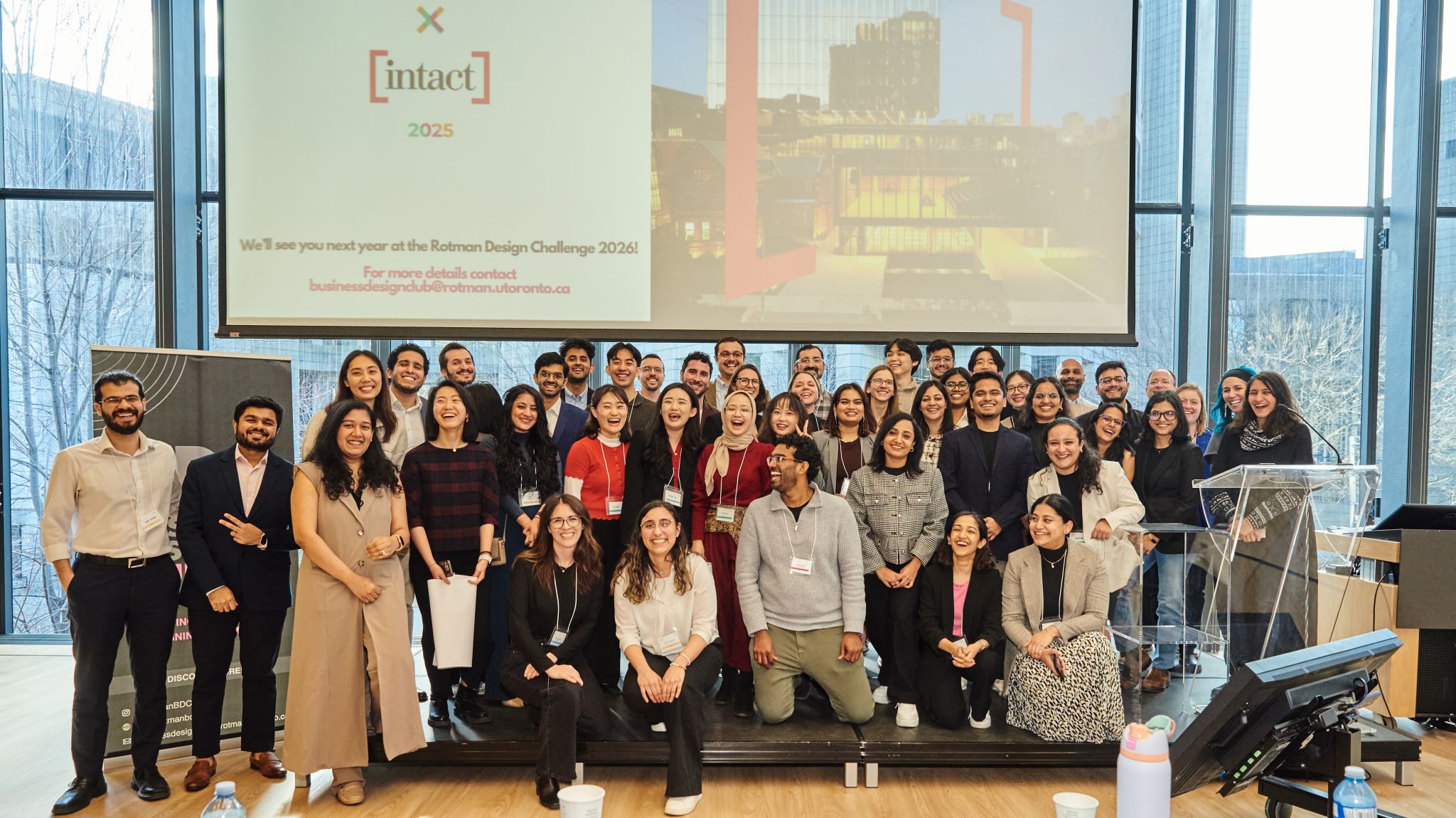
MS Strategic Design and Management Students Win Rotman Design Challenge
Every year, the University of Toronto’s Rotman School of Management hosts the Rotman Design Challenge, which brings together top talent from leading business and design schools from across the globe to propose solutions to a complex business challenge posed by an innovative and forward-thinking sponsor.
A team of MS Strategic Design and Management students won this year’s challenge, where another team of MS SDM students took 4th place, and four other Parsons teams placed in the semifinals. Team Northstar, who won, identified gig workers as a key target audience for the competition’s sponsor, Intact Insurance.
Their solution, Flexible Commercial Insurance, included disruptive features such as customizable duration for insurance plans and the ability to pause coverage when needed. Additionally, it introduced Polaris, a custom agentic AI model for Intact Insurance. Polaris simplifies and translates complex insurance terms to improve understanding and automates claims processing through hyper-personalized voice interactions.
“Winning this global competition feels incredible,” said Ananya Harshini and Alana Rhodin, two of the members of Team Northstar. “When we formed our team last October, we dreamed of this moment, but being selected to participate in February was already an honor in itself. The intense timeline forced us to dive deep into the creative process. Though stressful at the moment, this experience ultimately strengthened our soft skills and taught us to persevere through challenges. We learned that even the most complex challenges have solutions — sometimes you just have to think outside the box.”
Team Northstar, which also included Yash Sonwaney, Meenu Jitendrakumar Runiwal, and Jun Shin, tackled the competition’s guiding question “How might they improve the insurance experience for Intact’s customers,” through a comprehensive market review, looking at global trends and those specific to Canada. The gig economy continued to stand out, as the team found various individuals balancing multiple jobs—driving for Uber, assembling furniture, making deliveries, or assisting with personal tasks.
“It became clear that this group faces unique risks and uncertainties, yet often lacks access to insurance products that genuinely meet their needs,” explained Harshini and Rhodin. “That realization gave our research a clear direction and helped us focus our interviews and design efforts where we felt we could make the most impact.”
To illustrate these challenges, the team presented a human-centered narrative through Greg the Gig Worker and his daughter, highlighting these pain points and emphasizing the need for a tailored insurance solution that aligns with the unpredictable nature of gig work. Team Northstar concluded with Greg’s new journey using Flexible Commercial Insurance and Polaris, demonstrating how their solution not only meets users where they are but also fosters trust and long-term loyalty.
“Design thinking factored into our research and pitch deck through a structured process,” noted Harshini and Rhodin. “Taking the cue from Intact’s prompt, we conducted research by analyzing and synthesizing data to identify a core problem for our users. While it was less about traditional design thinking methods, we focused more on a human-centric approach. We leaned heavily into the research phase of design thinking, incorporating systems thinking to understand the broader context. The pitch deck itself was structured with storytelling at its core to effectively communicate our insights and solution.”
Parsons MS SDM students excelled in this year’s competition thanks to their human-centered approach to creating their design solutions. The program, which is housed in the School of Design Strategies at Parsons, trains students to move beyond surface-level observations, and encourages them to reframe problems until they uncover real human needs.
“When Rotman introduced structured frameworks such as mapping people, problems, and needs, it aligned naturally with our way of thinking and pushed us to go beyond templates to extract meaningful insights,” shared Harshini and Rhodin. “This foundation in both design methodology and stakeholder engagement helped us deliver solutions that were not only innovative but also truly responsive to the people we were designing for. For example, with gig workers, we started by understanding their lived experiences without assuming they fit into traditional employment models. That grounding made our approach more relevant and impactful.”
Looking ahead, Team Northstar will meet with the marketing team at Intact Insurance to discuss their proposal, and potentially develop their idea for further discussion and possible implementation.